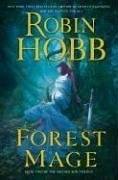

Forest Mage
by Robin Hobb
The Barnes Noble ReviewDark mysticism and primordial natural magic clash with the ever-expanding boundaries of the "civilized" world in the second volume of Robin Hobb's Soldier Son trilogy, Forest Mage. The sequel to 2005's Shaman's Crossing finds protagonist Nevare Burvelle -- the second son of a nobleman and destined for a career in the military -- with his world turned upside down. After surviving a plague that wiped out many of the students and instructors at the king's military academy, Nevare returns home for his brother's wedding, only to learn that he has been medically discharged from the school. The plague usually leaves its survivors skeletally thin, but Nevare, inexplicably, has begun to gain massive amounts of weight. With his family believing he's a glutton, Nevare is disowned by his father and eventually ends up finding work as a lowly cemetery guard in a frontier town near the border with the Specks, a race of dapple-skinned forest dwellers who possess powerful natural magic. But in a world where technology never stops advancing, can the Specks survive? And what does the suddenly bloated Nevare have to do with their struggle?Set in a sprawling, vividly described realm that is as majestic as it is menacing, and powered by some extremely topical themes (environmentalism, cultural homogenization, human rights, religious persecution, etc.), the Soldier Son trilogy is easily Hobb's most significant work to date. Incorporating elements of military fantasy, New Age spirituality, and political allegory, Forest Mage can be faulted only for suffering from a serious case of middle-volume syndrome: As the second installment of a trilogy, it lacks both a true beginning and a satisfactory ending. All will be forgotten, however, when the concluding volume (tentatively entitled Renegade Magic) of this unique and powerfully moving saga is released in 2007. Paul Goat Allen
Release Date:
August 28, 2006

